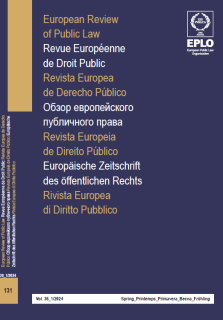
Essential State Functions and Digitalization in the Age of the ‘Regulation Revolution’
Márton Sulyok
JD, PhD, LLM, University of Szeged, Faculty of Law and Political Sciences, Institute of Public Law, Senior Lecturer in Constitutional Law and Human Rights; Head of the Public Law Center at Mathias Corvinus Collegium in Budapest (Hungary)
The paper summarizes legal arguments regarding essential functions in the context of innovation, digitalization, and the platform economy, focusing on the nature of the relationship between the state and technological revolution. The paper puts forward arguments framed to fit the context of a ‘Regulation Revolution’ describing sudden and sometimes sweeping surges of regulation in response to the increased spread of disruptive technologies. The paper also examines the role of the state and enumerates certain essential state functions that remain important, especially within the meaning of Article 4(2) TEU, the Treaty provision that has ignited the debate on these functions after the adoption of the Lisbon Treaty.
Keywords: Essential state functions; TEU; digitalization; regulation; innovation; Brussels effect; platforms; disruptive technology
Le document résume les arguments juridiques concernant les fonctions essentielles dans le contexte de l’innovation, de la numérisation et de l’économie de plateforme, en se concentrant sur la nature de la relation entre l’État et la révolution technologique. Le document présente des arguments qui s’inscrivent dans le contexte d’une “révolution de la réglementation” décrivant des poussées soudaines et parfois radicales de réglementation en réponse à la propagation croissante des technologies perturbatrices. Le document examine également le rôle de l’État et énumère certaines fonctions essentielles de l’État qui restent importantes, en particulier au sens de l’article 4, paragraphe 2, du traité UE, la disposition du traité qui a enflammé le débat sur ces fonctions après l’adoption du traité de Lisbonne.
Mots-clés: Fonctions essentielles de l’État; TUE; numérisation; réglementation; innovation; effet “Bruxelles”; plateformes; technologie pertubatrice





















